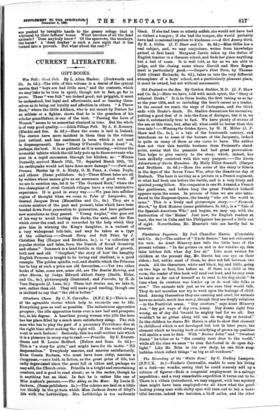Old England on the Sea. By Gordon Stables, M.D. (J.
F. Shaw and Co; 5s.)—Here we have, told with much spirit, the "Story of Admiral Drake." It is in three books, the first taking us as far as the year 1564, and so including the hero's career as a trader. In the second we reach the siege of Cartagena, and the third ends with Drake's death. Dr. Stables dramatises his narrative, putting a good deal of it into the form of dialogue, but it is. we take it, substantially true to fact. We have plenty of stories of the sea at this time, but, after all, what could be better than this true tale I— Winning the Golden Spurs, by M. H. Miller (J. F. Shaw and Co., 6s.), is a tale of the fourteenth century, and introduces us to some of the horrors of the Jacquerie, indeed to quite as many of them as one cares to have. The author does not view this terrible business from Froissart's stand- point, seeing that the peasants had had great provocation. This helps to give variety to the story, which, indeed, hae been skilfully contrived with this very purpose. —The Lively Adventures of Gavin Hamilton. . By Molly Elliot Seawell. (Harper and Brothers. 3s, 6d.)—Here the scene of the story is Silesia in the days of the Seven Years War, after the disastrous day of Rosbach. The hero is serving as a private in a French regiment, or what had been one before the battle, and is a very lively and spirited young fellow. His companion is one St. Arnaud, a French fine gentleman, and before long the great Frederick hirimelf appears upon the scene. In process of time we are also intro- duced to the Empress-Queen, the beauty "who set the world in arms." This is a lively and picturesque story.—"Forward, March," by Kirk Munroe (same publishers, 3s. 6d.), is a "Tale of the Spanish-American War," and begins, we may say, with the destruction of the ' Maine ' Just now, for English readers at least, the war in Cuba and the Philippines has passed a little out • of sight. Nevertheless, Mr. Munroe's tale can hardly fail to interest.






















































 Previous page
Previous page